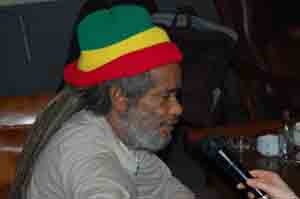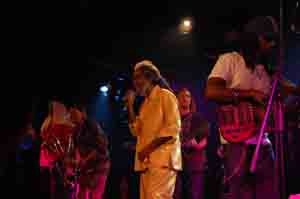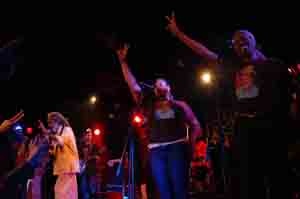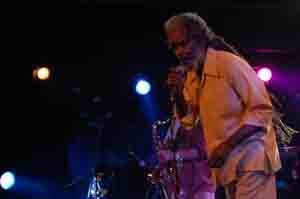irások Max Romeo angol
Max Romeo
A38, Budapest, 28.02.2008. << magyar verzió >> << Listen to the interview! >>
Stráhl Kati: What is behind the name – Max Romeo? Max Romeo: It was given to me by some friends of mine when I was younger. They figured I was like a Romeo to the girls, like this Romeo and Juliet thing, they started calling me Romeo and the name stick on me from then. SK: Was it given by Bunny Lee? MR: Right, Bunny Lee and some other guys on the corner.SK: What can you say today about the past controversy of the 1969 track called Wet Dream, while today every second song is much more sexual than that? MR: In 1969 it was a different type of world we lived in. And the world changed from the year 2000 as Nostradamus predicted. In them days it was the No-No, sex was a bedroom thing, it wasn't to be discussed outside the bedroom, so for me to be singing about wet dream, and for the younger kids to be actually jumping to the music, it was something like a revolution to the British public at the time. But the song was played one time on the radio, and banned, it made its way to the charts, it stayed in the charts for 26 weeks, went as far as No. 2. It started a whole revolution of sex songs then, you know with Prince Buster, Judge Dread, Lloydie & The Lowbites, all these guys came on the bandwagon after.  SK: After this rudeboy image you soon shifted to Rastafarianism in your music... MR: Yeah, after I started getting children, I figured out that if I continue in this trend, then how do I explain it to my kids? What kind of role model I would be to my children, and I just basically stopped. I embraced the fate of Rastafari in 1972, and I started doing mostly cultural songs then, and I continue until nowSK: Did you choose a particular order? Today we see many musicians choose the Bobo Ashanti, or as Bob Marley chose the Twelve Tribes... MR: I'm from the Nyabinghi order. But Rasta is just Rasta, whatever brand they put on it. It's not really a religion or a cult, it's one trying to find oneself, because oneself is inner, so they are more within you than what you can see with the eye on the outside. The half that's never been told, we try to find that half. It's just a concept different from religion in general. SK: Basically it started off as a religion of black consciousness, but now more and more white people are taking it up too. What do you think of that? MR: Rasta really don't have no colour barrier, rasta is for the world, for all nation, all people can be involved, because we don't have no temple in any way, each of us are gathered and we discuss our stance and the faith, and things like that. But it's open for any race, it's not just a black thing, it's a people's thing.
SK: After this rudeboy image you soon shifted to Rastafarianism in your music... MR: Yeah, after I started getting children, I figured out that if I continue in this trend, then how do I explain it to my kids? What kind of role model I would be to my children, and I just basically stopped. I embraced the fate of Rastafari in 1972, and I started doing mostly cultural songs then, and I continue until nowSK: Did you choose a particular order? Today we see many musicians choose the Bobo Ashanti, or as Bob Marley chose the Twelve Tribes... MR: I'm from the Nyabinghi order. But Rasta is just Rasta, whatever brand they put on it. It's not really a religion or a cult, it's one trying to find oneself, because oneself is inner, so they are more within you than what you can see with the eye on the outside. The half that's never been told, we try to find that half. It's just a concept different from religion in general. SK: Basically it started off as a religion of black consciousness, but now more and more white people are taking it up too. What do you think of that? MR: Rasta really don't have no colour barrier, rasta is for the world, for all nation, all people can be involved, because we don't have no temple in any way, each of us are gathered and we discuss our stance and the faith, and things like that. But it's open for any race, it's not just a black thing, it's a people's thing.
SK: Tonight we could also hear the famous track Let The Power Fall On I, which was used as a campaign song for Michael Manley in the beginning of the 1970s... MR: Well, they asked my permission to use that song, I wasn't actually a partisan person. I wans't really involved in any particular party or anything. I just like the concept that Michael Manley came with, which was democratic socialism, something different from what was happening, and they asked my permission to use the song, and I gave them the OK, and that was it, it just bacame the party's slogen song, the power. SK: Would you do it today? MR: No, I wouldn't do it today. Politics has become such a serious thing with people, that there is no place in politics for humour anymore, so I wouldn't try that today. SK: You worked a lot with Lee Perry. What do you say about him today? MR: I still hold him to be one of our best producers, his track record is there to show, with Bob Marley, even coordinated things with Paul McCartney... He's really a big figure in the musical world. I owe a lot to him for that album War Ina Bablyon. We worked on it together, and it's been a success. It was recorded in 1976, and it's still one of the No.1. albums around today, with Chase The Devil as one of the main tracks on it. SK: How did that come about? MR: Lee Perry is always on to the devil, there's something about him and Satan, they don't seem to agree, and he actually came with the concept that we could do something like that, so I wrote the lyrics and he did the production, and it turned out to be a success. SK: Why did he call you Judas, the White Belly Rat? MR: I really don't know, we had some little differences during the Island Records thing. What happened... we had a joint agreement with Island Records, but obviously he was taking money, and I wasn't getting any, so I kind of got myself out of the contract, and he figured that I was a traitor for doing that, but it was just a spare-another-moment-thing, because after he met me, after we met on the subject, we realised that it was stupid for him to feel the way he felt, and he actually changed his concept towards me. SK: You still meet? MR: Yeah, we're friends, we're friends for life actually. SK: Do you know he recently stopped smoking ganja? MR: Well, maybe it had affected his health, and maybe his doctor told him to stop, and I wish it was a good idea that he did, that means he's got good will power, he didn't have to go to rehab. I hold him in high esteem. And it's good that he stopped smoking. I still smoke a little herb now and again, because it's a part of my inspiration. Anything you do excessive, it will hurt you, I don't do it excessive, so I feel comfortable doing it. SK: And you live in the ital way totally? MR: Yeah, well, sometimes I tend to... You know, I'm a farmer in Jamaica, I raise a lot of goats, and sometimes I eat a piece of the goat, but I'm basically vegetarian in most cases. SK: So you have a farm in Jamaica?
SK: Do you know he recently stopped smoking ganja? MR: Well, maybe it had affected his health, and maybe his doctor told him to stop, and I wish it was a good idea that he did, that means he's got good will power, he didn't have to go to rehab. I hold him in high esteem. And it's good that he stopped smoking. I still smoke a little herb now and again, because it's a part of my inspiration. Anything you do excessive, it will hurt you, I don't do it excessive, so I feel comfortable doing it. SK: And you live in the ital way totally? MR: Yeah, well, sometimes I tend to... You know, I'm a farmer in Jamaica, I raise a lot of goats, and sometimes I eat a piece of the goat, but I'm basically vegetarian in most cases. SK: So you have a farm in Jamaica?
MR: Yes, I have a farm in Jamaica. I plant bananas, ground produce and animals. SK: And your children or family live there? MR: Yeah, I got 4 kids there, 2 boys and 2 girls, and my wife. SK: What's your wish and your message for the future? MR: My wish for the future is that they would turn all weapons into plough-shares and forget wars and forget borders. The world was intended to be a paradise, and it becomes a paradox. My dream is for a peaceful world where people don't study war anymore, no racism, no classism, no sexism, just pure love. That's the type of world I dream. SK: You think we can achieve it? MR: Yeah, we can achieve it, if we all try to think that way and work towards it, beacuse we are the world, we are the people, it's us, anything that's negative it's us, if it's positive it's us. And I think it could be all positive, we could do without wars. SK: What do you think of Jamaican music today, these new 'conscious' artists. Do you like it? MR: Yeah, it's good, it's good. Apart from the dancehall-thing which is a little too violent for my liking, glorifying the gun and the suspecting women, that's what the dancehall music actually do, I'm not a part of that, I like my roots and culture music, I like my love songs as well. SK: Is it also the sound of the dancehall or just the lyrics that you don't like? MR: The lyrics, it's the lyrics I don't appreciate. SK: Do any of your children play music? MR: Yeah, they just formed a group, they call themselves My Kids, we just did a record, them call it Singing The Blues. You'll be hearing more of it in the future, it's not yet on the market out here, but it's gonna be out soon. - Kati Stráhl and Balázs Vajna -
SK: You think we can achieve it? MR: Yeah, we can achieve it, if we all try to think that way and work towards it, beacuse we are the world, we are the people, it's us, anything that's negative it's us, if it's positive it's us. And I think it could be all positive, we could do without wars. SK: What do you think of Jamaican music today, these new 'conscious' artists. Do you like it? MR: Yeah, it's good, it's good. Apart from the dancehall-thing which is a little too violent for my liking, glorifying the gun and the suspecting women, that's what the dancehall music actually do, I'm not a part of that, I like my roots and culture music, I like my love songs as well. SK: Is it also the sound of the dancehall or just the lyrics that you don't like? MR: The lyrics, it's the lyrics I don't appreciate. SK: Do any of your children play music? MR: Yeah, they just formed a group, they call themselves My Kids, we just did a record, them call it Singing The Blues. You'll be hearing more of it in the future, it's not yet on the market out here, but it's gonna be out soon. - Kati Stráhl and Balázs Vajna -